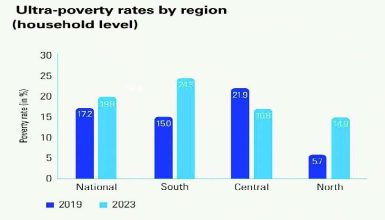Banks’ profitability, assets rise, says RBM
The Reserve Bank of Malawi (RBM) says profitability and assets of some commercial banks have grown amid slightly elevated levels of credit and threat of the Covid-19 pandemic.
The RBM Financial Stability Report for 2020 shows that banks’ earnings performance was considered satisfactory as measured by profit after-tax as it increased by 33.1 percent year-on-year to K81 billion at the end of December 2020.
The report, which is the central bank’s bi-annual analysis on the macroeconomic and financial sector developments between July and December 2020, indicates growth in assets for banks stood at K2.24 trillion at end December 2020, a growth rate of 10.1 percent in the second half of 2020.
Comparatively, the second half growth rate was higher than the growth rate of 7.9 percent recorded in the first half of 2020.

RBM Governor Wilson Banda, who is also registrar of financial institutions, said in the report that the banking sector remained sound and resilient during the review period as evidenced by adequate capital, increased earnings, sufficient liquidity and slightly improved asset quality.
He said the stress testing results revealed that the banking sector was resilient to some shocks and vulnerable to other shocks during the period under review.
Said Banda: “The sector also remained adequately capitalised as evidenced by capital ratios which were well above the regulatory benchmarks.
“In December 2020, core and total capital ratios stood at 17.9 percent and 21.3 percent which was above the regulatory benchmarks of 10 percent and 15 percent, albeit a decline from 18.8 percent and 22 percent, respectively reported in June 2020.”
In terms of credit concentration by economic sectors, it was concentrated in wholesale and retail trade, agriculture and community social and personal services sector which accounted for 55.9 percent of gross loans and leases.
The report further shows that 62.7 percent of non-performing loans (NPLs) were dominant in wholesale and retail, electricity, gas, water and energy and construction sectors with 44.6 percent, 9.4 percent and 8.8 percent respectively.
However, the report indicates that credit concentration risk remained a threat to the sectors’ stability as they continued to contribute more than 50 percent of gross loans and leases.
“This meant that a downturn in any of these sectors would cause a high proportion of banks’ outstanding loans to become non-performing,” reads the report.
The Covid-19 pandemic, according to the report, continued to pose concern to the stability of the sector largely due to its effect of reducing economic activity, resulting in high risk of increased NPLs, high cost of preventative measures and reduction in revenues and profits, among other things.
In an earlier interview, Bankers Association of Malawi chief executive officer Lyness Nkungula said banks have been impacted by the Covid-19, but the risk was minimal.
She said: “Banks have a better business risk management profile that has helped them to sail through the turbulent times. The diversification of products and technology has helped to intensify the resilience.”
Market analysts have also indicated that banks’ resilience is not surprising due to their diversified incomes sources.





